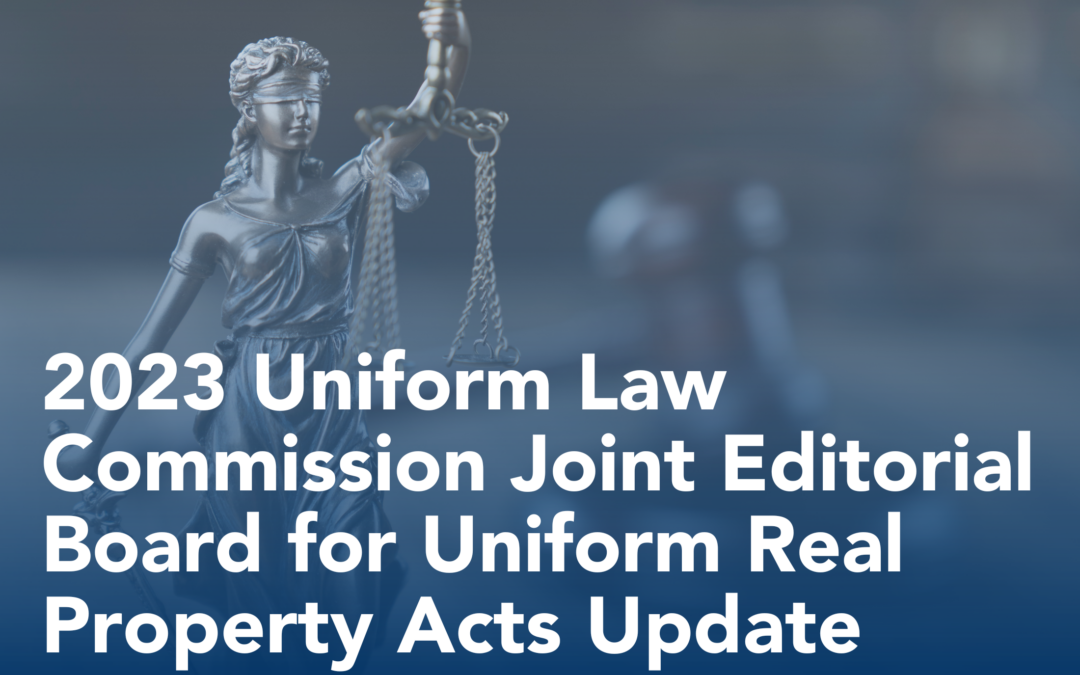The Uniform Law Commission (ULC) provides states with non-partisan, well-conceived and well-drafted legislation that brings clarity and stability to critical areas of state statutory law. Currently, six joint editorial boards are appointed by the ULC in various subject areas. Each of these subject-matter boards are responsible for monitoring new developments and presenting recommendations for relevant updates to certain uniform Acts.
The Joint Editorial Board (JEB) for Uniform Real Property Acts is one of the six current boards, which was originally a joint effort of the ULC and the American Bar Association’s Section of Real Property, Probate and Trust Law, now includes representatives from the American College of Real Estate Lawyers, the American Land Title Association, the American College of Mortgage Attorneys, and Community Associations Institute (CAI). The goal of the JEB is to monitor developments in legislation and judicial decisions affecting real property and recommend subjects for possible uniform laws.
David Ramsey, Esq., CCAL, of Becker in New Jersey, is CAI’s current liaison member to JEB. Ramsey provided this overview on issues JEB is currently reviewing relevant to the community association housing model in 2023.
A New Framework for Condominium Structural Safety Reforms
Following the partial collapse of the Champlain Tower South Condominium in Surfside, Fla., JEB reviewed a pending law review article describing structural safety issues confronting condominiums presently. This article describes problems facing some high-rise communities and the failure to adequately maintain reserves. The article included discussion of the high sensitivity of owners who may be unable to pay their share of an assessment or borrowing, which could result in the loss of a unit. Several non-traditional solutions also were discussed to raise funds for structural repairs. CAI is connecting with the authors of this article to discuss other industry mechanisms to fund structural repairs.
Electric Vehicle Charging Station Proposal
The JEB has previously recommended that a study committee be formed to consider a uniform Electric Vehicle Charging Station Act. This recommendation garnered a partisan concern discussion by the board. CAI presented many issues confronting community associations, including the insufficient capacity in the electric supply in many established associations to handle the introduction of a certain volume of chargers. The issue of cost increases for electric supply, what expense owners should bear as an improvement to common elements, and other issues also were contemplated during this discussion. This conversation will be considered in the next round of recommendations on the topic in 2024.
Cao v. PFP Dorsey Investments (Arizona Court of Appeals)
This Arizona Court of Appeals decision involves the review of termination provisions of Arizona’s Common Interest Ownership Act (ACIOA). In short, PFP Dorsey purchased 96 out of 100 units in a condominium created in 2007. PFP Dorsey then sought to terminate the condominium, and Cao was not satisfied with the value to be paid under the termination plan. The court reviewed the termination provisions in effect when Cao purchased the unit. The termination provisions were revised under updates to ACIOA that made termination easier and might have had a negative impact on the price Cao would be paid. Neither of the termination provisions followed the model UCIOA provisions on termination.
The court held that upon purchasing the property Cao’s “reasonable expectations” could not have included the manner in which ACIOA was amended.
While the case was of some interest, JEB determined there was no need to comment on the case given ACIOA does not follow UCIOA’s model termination provisions. This case was appealed to the Arizona Supreme Court. CAI provided information to the JEB on amicus efforts by the industry, which can be found here.
Newly Published: The Uniform Unlawful Restrictions in Land Records Act
The ULC also announced a Uniform Unlawful Restrictions in Land Records Act in October. The act allows homeowners to remove unlawful restrictive covenants from the deeds to their homes and allows the removal of unlawful restrictive covenants from governing documents of condominiums and other homeowner associations. While discrimination in the sale, rental, and financing of housing has been illegal since the Fair Housing Act (FHA) of 1968, many property records today still contain offensive and unlawful restrictions that predate FHA.
To preserve the chain of title and history of the property, the act does not allow these restrictions to be physically destroyed or redacted. Instead, the act permits the homeowner or association to fill out an amendment form and record the amendment to their title to remove the unlawful restriction. A sample form is provided in the act.
This act aligns with CAI’s public policy amendment process to remove discriminatory restrictive covenants established by the CAI Government and Public Affairs Committee and Board of Trustees in 2019. Learn what states established this procedural policy to date here.
Visit CAI Advocacy for additional resources on these topics here.



